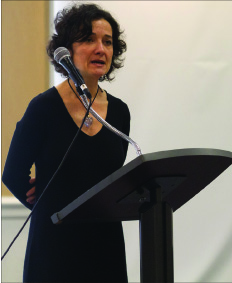
By Stephanie Frustaci
Correspondent
Federica Anichini, assistant professor of modern languages, delved into the style of Italian poet Guido Cavalcanti on Thursday, Feb. 17 during this semester’s first Close Reading. Drawing from her book, “Voices of the Body,” Anichini discussed Cavalcanti’s work.
This 13th-century poet lived and worked in Tuscany and was a friend of Dante Alighieri, author of “The Divine Comedy.”
Anichini not only read and explained three sonnets; she also gave insight into the world of poetry in the 13th century.
Anichini told her audience that the poets from this time primarily wrote about love. She also noted that poets were considered “thinkers and intellectuals.”
Cavalcanti’s sonnets came from his collection of poems, “Rime.” These poems were composed using the language of the day, so some interpretation is required when translating them to contemporary Italian.
In Sonnet IV, the subject of the poem is a woman. The speaker is captivated by her beauty and is speechless to describe what he is viewing. Anichini explained that it was a “physical phenomenon” to the speaker. In the last line of the poem, Cavalcanti uses the Italian word conoscenza. Directly translated, this word means knowledge, but Anichini explained that the poet meant “love as learning, as acquiring something.”
In Sonnet VIII, Anichini revealed that the “author’s mind is filled with pain.” This poem dealt with communication by means of the body, a term Anichini described as “physiological language.” The speaker of the poem is heartbroken, as depicted by the wound mentioned at the end of the poem. Anichini articulated that this wound was a sign that the speaker is dead inside. With his detached feeling, the speaker was even portrayed as “a puppet,” Anichini said.
In Sonnet XVIII, Cavalcanti continues to explore a theme of disconnection. As Anichini put it, in this sonnet, “the hand writes, not the author.” Cavalcanti was simply letting his hands do the work, according to Anichini.
After analyzing the three sonnets, Anichini engaged in a discussion concerning the competition between Cavalcanti and Alighieri.
Anichini brought up the major issue with Cavalcanti’s thoughts and ideas in the 13th century.
According to Anichini, Cavalcanti believed that communication lay within the senses and not with concrete thought. Alighieri disagreed. Anichini proposed this — the fact Alighieri and Cavalcanti had fundamentally different views of poetry — as a reason Alighieri’s work has historically outshined Cavalcanti’s.
Anichini said that Ezra Pound, a 20th-century American poet, helped bring Cavalcanti’s work its deserved recognition.
When asked why she chose to write about the work of this Italian poet, Anichini said, “I sat in a class where they taught Guido Cavalcanti and found him very interesting.”






